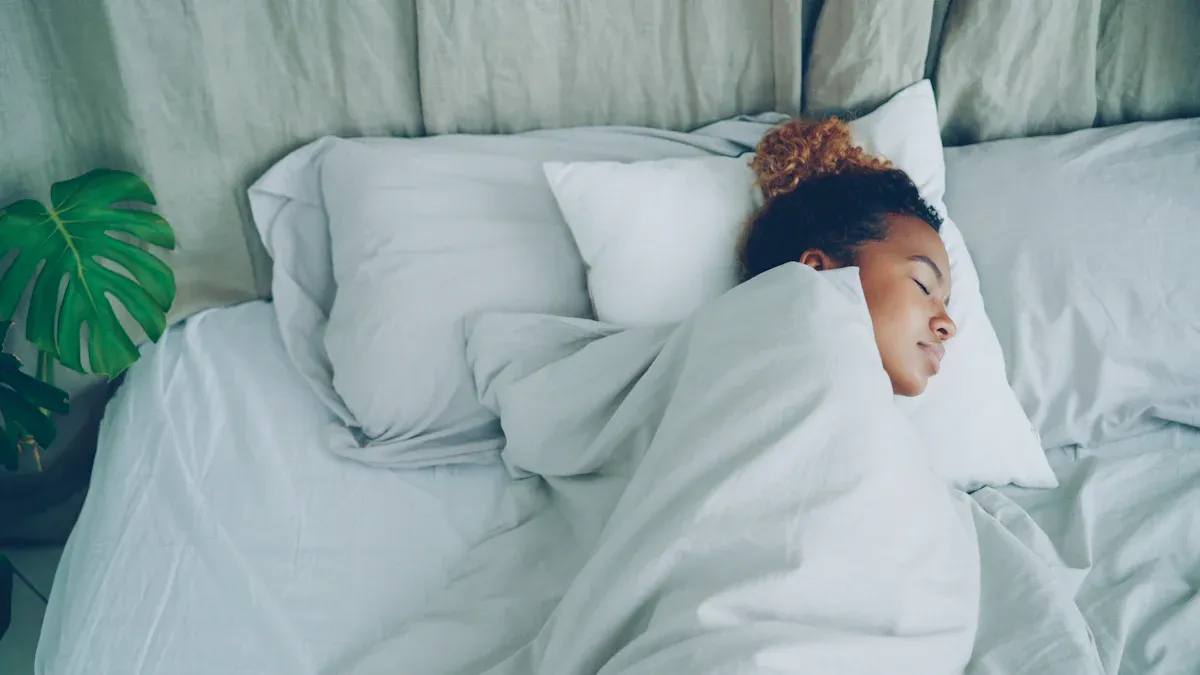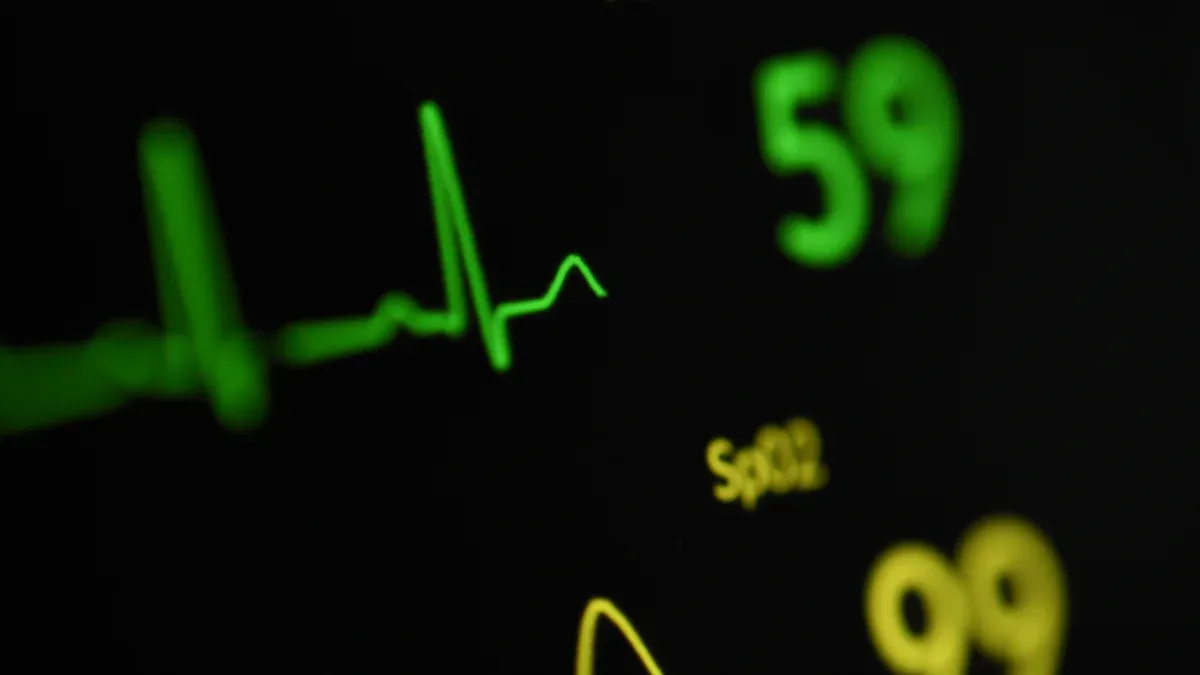You might wonder when to worry about low heart rate while sleeping. Most adults experience a heart rate between 50 and 70 beats per minute during sleep, which is about 10-20% lower than during the day. A slow heart rate at night is common and usually means your body is resting well. Sometimes, though, a heart rate that drops too low can signal a problem—especially if you feel dizzy, weak, or short of breath. Pay close attention to how you feel and notice any new or unusual symptoms. Your comfort and safety matter most.
Key Takeaways
- A low heart rate during sleep is often normal, especially for athletes. Most adults have a heart rate between 50 and 70 beats per minute while sleeping.
- Watch for warning signs like dizziness, chest pain, or shortness of breath. These symptoms may indicate a dangerously low heart rate that needs medical attention.
- Use wearable devices to monitor your heart rate while sleeping. This can help you track changes and share important data with your doctor.
- If you notice any unusual symptoms, keep a log of your heart rate and symptoms. This information can help your doctor understand your health better.
- Stay active, manage stress, and maintain a balanced diet to support your heart health. Aim for 7-9 hours of sleep each night.
Low Heart Rate During Sleep

Normal Ranges
Your heart rate slows down when you sleep. Most healthy adults have a sleeping heart rate between 60 and 100 beats per minute. Many people see their heart rate drop closer to 55–65 beats per minute during deep sleep. This drop helps your body rest and recover. If you exercise often or play sports, you might notice your heart rate is even lower at night. Athletes often have a lower resting heart rate because their hearts work more efficiently.
| Group | Resting Heart Rate (beats/min) |
|---|---|
| Athletes | 65.6 (8.1) |
| Non-Athletes | 68.1 (7.9) |
| Difference | 5.4 |
Factors Affecting Heart Rate
Many things can change your heart rate while you sleep. Age plays a big role. Older adults may have a lower heart rate at night. Your fitness level matters too. If you are very active, your heart gets stronger and beats slower. Some medicines, like beta blockers, can lower your heart rate. Hormonal changes, such as menopause or pregnancy, also affect your heart’s rhythm. Sleep disorders, like sleep apnea, can disrupt your heart rate and cause it to spike or drop suddenly.
Tip: If you take medicine or have a health condition, ask your doctor how it might affect your heart rate during sleep.
Common causes of low heart rate during sleep include:
- Sinus bradycardia
- Sinus pauses (up to two seconds)
- Type 1 second degree atrioventricular block
- Obstructive sleep apnea
- Congestive heart failure
When Is It Too Low?
You should pay attention if your heart rate drops below 40 beats per minute while you sleep. This level is called bradycardia. Sometimes, bradycardia is normal for athletes or people who are very fit. For others, a very low heart rate can signal a problem. Conditions like hypothyroidism, heart disease, heart attacks, inherited heart abnormalities, myocarditis, and sleep apnea can cause bradycardia. Inflammatory diseases such as rheumatic fever or lupus may also lead to a low heart rate. If you feel dizzy, weak, or short of breath, you should talk to your doctor.
Note: Persistent bradycardia or a low heart rate with symptoms needs medical attention.
When to Worry About Low Heart Rate While Sleeping
Warning Signs
You might wonder when to worry about low heart rate while sleeping. Most people do not feel anything wrong. But some warning signs can show up if your heart rate drops too much at night. Watch for these symptoms of sleep bradycardia:
- Chest pain
- Confusion or memory problems
- Trouble exercising
- Dizziness or feeling lightheaded
- Fainting
- Feeling tired or having low energy
- Heart palpitations
- Shortness of breath
If you notice any of these signs, your body may not get enough blood and oxygen while you sleep. These symptoms can mean your heart is beating too slowly. When to worry about low heart rate while sleeping depends on how you feel and if these symptoms happen.
If you wake up dizzy, weak, or confused, pay attention to these signs. Your heart may need help to keep you safe.
Dangerously Low Heart Rate
A very low heart rate can cause serious health problems. When to worry about low heart rate while sleeping is urgent if you have any of these symptoms. The table below shows what to look for and what it could mean for your health:
| Symptoms | Implications |
|---|---|
| Feeling lightheaded or dizzy | May mean your heart rate is too low |
| Fainting | Could mean severe bradycardia |
| Fatigue | Might mean not enough blood flow |
| Shortness of breath | Can mean trouble with breathing |
| Worse chest pain | May mean your heart problem is getting worse |
| Worse heart failure | Could mean your heart is not working well |
| Cardiac arrest (rare cases) | Extreme danger needs quick help |
Pay close attention if you have chest pain that lasts more than a few minutes, shortness of breath, or fainting spells. These can be signs of dangerously low heart rate. Bradycardia can lead to heart failure, frequent fainting, or even cardiac arrest if not treated. Sleep apnea can make these problems worse by lowering oxygen levels during sleep.
When to Get Help
Knowing when to worry about low heart rate while sleeping can help keep you safe. Most people do not need to worry if they feel fine. But you should get help if you notice warning signs. Doctors say you need emergency help if you have bradycardia with abnormal vital signs, poor blood flow to your hands and feet, a heart rate that does not change with activity, or a sudden drop in heart rate.
| Condition | Recommendation |
|---|---|
| Bradycardia during sleep | Usually normal; get medical help only if warning signs show up. |
| Red flags indicating need for emergency help | Bradycardia with abnormal vital signs, poor blood flow to hands and feet, heart rate that does not change, possible brain problems, sudden drop in heart rate. |
| Critical condition | Call for emergency help if the child looks very sick. |
If you feel dizzy, lightheaded, tired, short of breath, or confused, or if you faint, get medical care right away. Untreated low heart rate can make it hard for your heart to pump enough blood and oxygen. Over time, this can cause more serious health problems. When to worry about low heart rate while sleeping is simple: always listen to your body and get help if you feel sick.
What to Do Next
Monitoring at Home
You can check your heart rate at home with easy tools. Many people use smartwatches to see their heart rate while sleeping. Some new gadgets use sensors on your neck or record sounds from your throat. These tools measure your heart rate and how you breathe. They help you notice if your heart rhythm changes. Doctors use electrocardiograms (ECG) in clinics, but these are not for home use. Home devices make it simple to watch for low heart rate and catch bradycardia early.
Tip: If your heart rate drops or you feel bad, write down the time and what happened.
Talking to Your Doctor
If you feel dizzy, have chest pain, or cannot breathe well, talk to your doctor. Your doctor will ask about your symptoms and things like your age or if you have heart disease. They may check your heart with an ECG or use a Holter monitor for a few days. Sometimes, doctors use patch recorders or small devices under your skin for longer checks. These tests help find out if you have bradycardia or another heart problem.
What to Share
When you see your doctor, make a list of your symptoms and any changes you noticed. You should tell your doctor if you have:
- Dizziness or feeling lightheaded
- Chest pain
- Fainting or almost fainting
- Feeling tired after small tasks
- Trouble breathing
Also, tell your doctor about any medicine you take and any health problems, like sleep apnea or thyroid issues. Your doctor may ask you to change some habits to help your heart. Some common changes are:
| Lifestyle Change | Description |
|---|---|
| Managing Medications | Change medicines that might cause bradycardia. |
| Controlling Underlying Conditions | Treat sleep apnea, fix electrolyte problems, or help thyroid issues. |
| Quitting Smoking | Stop smoking to keep your heart healthy. |
| Limiting Alcohol Use | Drink less alcohol to help your blood pressure. |
| Exercising Regularly | Walk or do other activities to keep your heart strong. |
Note: Writing down your symptoms and heart rate helps your doctor know more about your health.
Tracking Your Heart Rate

Using Wearables
You can use wearables to track your heart rate during sleep. Devices like the VERTU Aura Ring offer a comfortable and stylish way to monitor your health. The Aura Ring fits like a second skin and uses advanced sensors to measure your resting heart rate, heart rate variability, and blood oxygen levels. Its lightweight design lets you wear it all night without discomfort. The Aura Ring stands out with its intuitive app and AI health concierge, which gives you easy-to-understand feedback. Many users find that wearables help them spot unusual patterns, such as frequent waking or irregular heart rate while asleep. These devices can also suggest changes to improve your sleep, like setting a regular bedtime or adjusting your environment.
| Feature | Description |
|---|---|
| Comfort | Lightweight, all-night wear |
| Accuracy | 85%+ compared to clinical monitors |
| Battery Life | Up to 10 days |
| App Experience | Simple, clear, and actionable |
Wearables like the Aura Ring help you and your doctor notice trends and catch dangerously low heart rate or bradycardia early.
Understanding Your Data
When you look at your heart rate during sleep, focus on your resting heart rate and heart rate variability. A normal resting heart rate shows your heart is working well. If you see your resting heart rate stay high or drop too low, it could signal a problem. Heart rate variability tells you how your body handles stress and recovery. Both numbers help you understand your health. Wearables can show you these trends over time, making it easier to spot changes. Remember, consumer devices work well for tracking sleep and wake states, but they may not match the accuracy of clinical monitors.
- Resting heart rate links to heart health and risk of disease.
- High or low resting heart rate during sleep can mean higher health risks.
- Heart rate variability helps you see how your body recovers each night.
Keeping a Log
Keeping a log of your heart rate while asleep helps you take charge of your health. Write down your resting heart rate, heart rate variability, and any symptoms you notice. This log makes it easier to talk with your doctor. Real-time data from your wearable lets your doctor make better decisions and adjust your care. Many people feel more in control of their health when they track their numbers and share them with their healthcare team.
Tip: A detailed log helps you and your doctor spot patterns and respond quickly to any changes, including bradycardia.
You now know that a low heart rate during sleep is often normal, but you should watch for symptoms like dizziness or chest pain. Monitoring heart rate variability (HRV) can help you spot early signs of health risks.
| Key Findings | Implications |
|---|---|
| Low HRV during sleep links to higher stroke and depression risk. | Monitoring HRV gives early warning. |
| High, erratic HRV patterns signal future health issues. | Early intervention is possible. |
To support your heart health, try these steps:
- Stay active with regular exercise.
- Manage stress with relaxing activities.
- Eat a balanced diet.
- Limit stimulants.
- Aim for 7-9 hours of sleep each night.
Wearables like the Aura Ring can help you track these trends and share data with your doctor.
FAQ
What is sleep bradycardia?
Sleep bradycardia means your heart beats slower than usual while you sleep. You may see your heart rate drop below 60 beats per minute. Sleep bradycardia often happens during deep sleep. Many people experience sleep bradycardia without any problems.
Is sleep bradycardia dangerous?
Sleep bradycardia is usually not dangerous for most people. You may not notice any symptoms. If you feel dizzy, weak, or faint, you should talk to your doctor. Sleep bradycardia can sometimes signal a health problem if you have other symptoms.
How can I tell if I have sleep bradycardia?
You can use a wearable device to track your heart rate at night. If you see your heart rate drop below 60 beats per minute, you may have sleep bradycardia. You should also watch for symptoms like tiredness, dizziness, or chest pain.
What causes sleep bradycardia?
Sleep bradycardia can happen because your body relaxes during sleep. Athletes often have sleep bradycardia because their hearts are strong. Some medicines or health problems can also cause sleep bradycardia. You should ask your doctor if you have concerns about sleep bradycardia.
When should I see a doctor about sleep bradycardia?
You should see a doctor if you have sleep bradycardia with symptoms like fainting, chest pain, or trouble breathing. If you feel fine, sleep bradycardia is usually not a problem. Your doctor can help you understand if your sleep bradycardia needs treatment.







